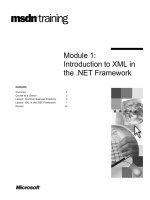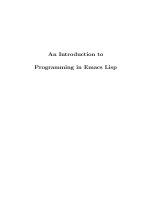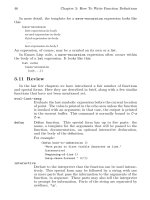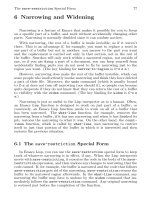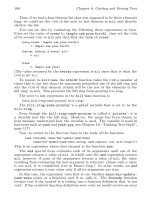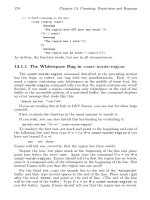Introduction to research in applied linguistics
Bạn đang xem bản rút gọn của tài liệu. Xem và tải ngay bản đầy đủ của tài liệu tại đây (1.73 MB, 62 trang )
Tutorial 1
Introduction to research
in applied linguistics
Supervisor: Dr. Kiều Thi Thu Hương
Group members:
Nguyen Thi Lan
Nguyen Thi Mien
Tran Thi Hoang Ngan
Class: K18B
1
Outline
1. What is the research?
2. What is the research carried for
3. A sample of research
4. Nature of social science and social reality
4.1. Social science
4.2. social reality
5. Research process in applied linguistics
5.1. A model of research process
5.2. Illustration from real research in
applied linguistics
6. Main approaches and some terms
1. What is research?
- The search for knowledge or any
systematic investigation.
- Discovering, interpreting, and
development of methods and
systems.
( />
What is research?
The systematic investigation into the
study of materials, sources…
to establish facts and reach new
conclusions.
(Oxford Dictionary)
What is research?
Other definitions:
• Research is the process of going up alleys
to see if they are blind
Marston Bates, American writer
• Research is what I am doing when I don’t
know what I am doing
Von Braun, American engineer
• If you steal from one author, it’s
plagiarism; if you steal from many, it’s
research.
Wilson Mizner, American dramatist
What is research?
A systematic process of inquiry
consisting of three elements:
- A question, a problem or a hypothesis
- Data
- Analysis and interpretation of data
(Nunan.D.1992. (2) Research Methods in Language Learning)
2. What is a research
carried out for?
General purposes:
- Discover new theories or laws
- Establish facts and search new
conclusions
- Interpret facts
- Revise accepted theories or laws
- To test models and develop theories
What is a research
carried out for?
Specific purposes:
- Get a result with scientific methods
objectively.
- Solve problems, verify the application
of theories, and lead on to new
insights.
- Enlighten: researcher and readers.
What is a research
carried out for?
- Prove/disprove new ideas, characterize
phenomena
- Carry out what is planned, support the
point of view, uncover what is not known,
satisfy inquiry.
- Discover the cause of a problem, to find
the solution to a problem, etc.
(Nunan.D.1992. Research Methods in Language Learning)
3. Research report sample
A model research:
Title: Learning vocabulary through games
The effectiveness of learning vocabulary through games
Author: Nguyen Thi Thanh Huyen
Khuat Thi Thu Nga
Source:
/>
Questions:
1. What are the objectives?
2. How are these objectives achieved?
Research report sample
1. Objectives:
- Find out the answer to the research
question about:
+ The effectiveness of learning
vocabulary through games.
+ How this way of learning helps
students to learn vocabulary.
Research report sample
2. How these objectives are achieved:
- Literature review
- Result and conclusion
- Research question
- Research instrument
- Study
- Process of data collection and
analysis
4.Nature of social science and
social reality
4.1 Social science
4.2 Social reality
4.1 Social science
Traditional view:
+ Same as the natural sciences
+ Discover natural and universal laws of
individual and social behaviours.
Social science
- Interpretive view:
+ Share the rigour of the natural
sciences
+ Share the concern to describe and
explain human behaviours
+ Emphasie the difference of people
from inanimate natural phenomena
and from each other
4.2 Social reality
Ontological assumptions:
- External to individuals
- Product of individual consciousness
Social reality
Espistemological assumptions:
Knowledge is
- Hard, objective and tangible:
researcher is observer.
- Personal, subjective and unique:
researcher- participant observer,
rejection of natural science methods,
anti-positivism.
(Based on the work of Burell and Morgan_1979)
Examples from a real research
A model research:
Title: Learning vocabulary through games
The effectiveness of learning vocabulary
through games
Author: Nguyen Thi Thanh Huyen
Khuat Thi Thu Nga
Source: />
Examples from a real research
• Traditional view:
- Students “learn new words with
meanings in their native language
without any real context practice.”
- Ss learn vocabulary by “writing words
on paper, learning passively through
the teacher's explanations.”
Examples from a real research
• Interpretive view:
Different views:
+ Decarrico (2001) states that words should not be
learnt separately or by memorization without
understanding.
+ Nation (2000, p.6) considers that the "look and
remember" way of vocabulary learning seems to be
not very effective for learners of the English
language.
+ Newton (2001) thinks learners should be required to
take part in a number of meaningful activities with
different tasks.
Examples from a real research
• Ontological assumptions:
The products of different writers' views:
• Nation (2000, p.6) concludes that "learning
new words is a cumulative process, with
words enriched and established as they are
met again",
• Newton (2001) believes “this approach can
enable learners to manage their vocabulary
meaning and develop their communicative
skills at the same time.”
Examples from a real research
Espistemological assumptions
The results of science methods:
The results of the study, to some extent,
support those of Decarrio (2001), Newton
(2001) and Nation (2000) since they claimed
that vocabulary games bring in relaxation
and fun for students, thus help them learn
and retain new words more easily.
5. RESEARCH PROCESS
5.1. Research process
5.2. The basic process of research
5.3. Illustration
5.1 Research process
A process of formulating
questions,
problems,
or
hypothesis, collecting data or
evidence
relevant
to
these
questions,
problems
or
hypothesis and analyzing or
interpreting data
(Nunan
1992).
5.2. A basic process of
research
• Problem / experience / observation
• Hypothesis
• Investigation and experimentation to
test the hypothesis
• Data gathering
• Data analysis and interpretation
• Confirmation or disapproval of the
hypothesis
(Wisker 2001)
